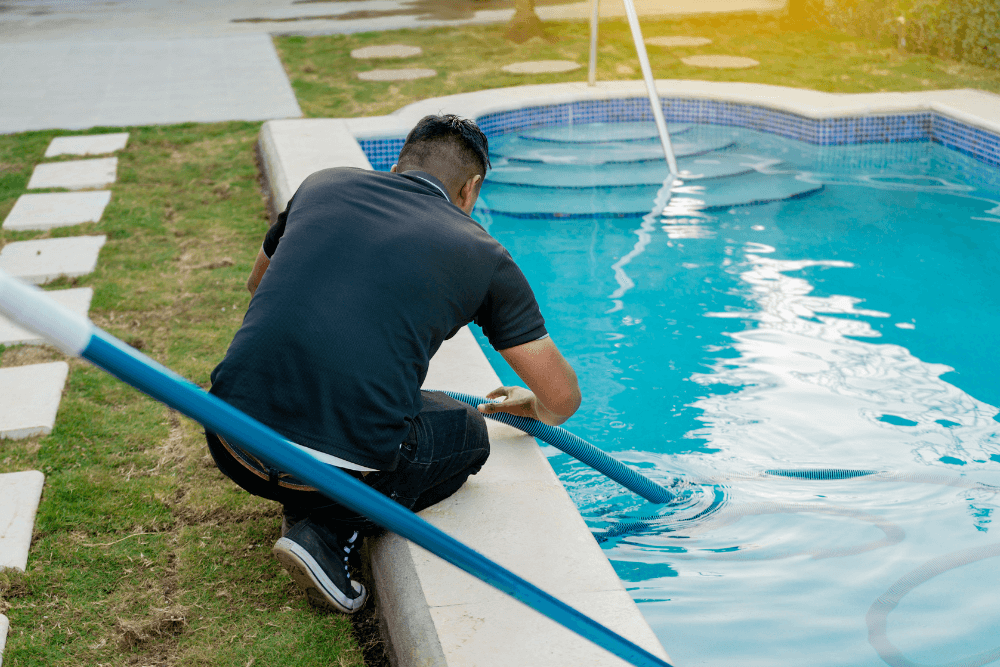The luxury of a saltwater pool is an enticing prospect for homeowners. Their alluring combination of being low-maintenance and gentler on your skin makes them a popular choice for those who want to enjoy a dip in the water with lower exposure to chlorine.
Be that as it may, saltwater pools are by no means “set it and forget it” luxuries. You’ll still need to develop the proper care regimen to ensure your pool water stays healthy. With that said, here’s a quick selection of pool maintenance tips that can help you keep your chemical levels well-balanced:
Testing, Testing
Most pools require you to test weekly for pH levels, with the ideal threshold being somewhere between 7.2 and 7.6. Many gush about saltwater pools because they’re healthier than chlorine pools, but they still contain some level of chlorine. The difference lies in how the chemical is generated.
You won’t add chlorine directly to a saltwater pool because all of the chlorine comes from electrolysis, but that’s not where the testing stops. There are other tests you should do monthly, including tests for alkalinity, cyanuric acid (CYA), and calcium.
You’ll also want to test your salt levels, aiming for 2,700 to 3,400 ppm. That number could vary, however, so check your generator’s manufacturing instructions to confirm how much you’ll need.
There are other times you should consider testing as well. Any time the pool has heavy use, like after pool parties, is a good time to test and potentially shock your pool. You’ll also always want to test after a rainstorm, as precipitation can dilute your pool’s chemicals and thus require you to freshen them up.
Using liquid tests is often the most thorough approach, but realistically, homeowners won’t always want to go through the whole song and dance every time. If you’re in a rush, you can use a pH test strip or pool chemical strip to get baseline information. It’s not a substitute for a complete test, but it’ll do in a pinch. Cutting some corners and using faster, more straightforward tests is always a much better notion than skipping testing altogether.
Shocking Stuff
With chlorine pools, there are moments when you’ll take one look at the setup and have the urge to shock it to start fresh. You can still keep up that practice with saltwater pools, and it is recommended if you have green or cloudy water, low chlorine levels, or surface stains. Just remember to test your water before you add the shock, as adding it to unbalanced water could cause unwanted results, like crystalline deposits manifesting thanks to a higher calcium concentration.
It’s worth mentioning that the appeal of saltwater pools is that the high salt content makes them somewhat self-cleaning. However, that doesn’t mean pool maintenance tasks like shocking won’t help keep the water clean(er). There’s merit to shocking your pool occasionally, even if you’re less likely to do it overall compared to owning a traditional chlorine pool.
Chlorine Content and You
Chlorine levels are still important in saltwater pools, but some homeowners may hesitate to add more, thinking it won’t work with their system. Nevertheless, a good chlorine balance is crucial for keeping your water clean, so adding chlorine tablets can be a temporary solution to rebalance your chemical levels. It isn’t necessarily the standard, but it won’t cause significant issues.
You should be testing your pool’s chlorine levels weekly, along with its pH. Your goal is 1.0 ppm to 3.0 ppm. You can use your chlorine generator to adjust your levels, which can be enough to eventually get it back to the correct number, but tablets are faster, and you can employ either as needed.
Don’t Underestimate the Value of Professional Pool Maintenance
Saltwater pool maintenance isn’t necessarily complex, but it can be time-consuming to do correctly. As such, many homeowners entrust their pool care to a local maintenance and cleaning company. It can also be a wise option if you can’t seem to get the balance of your pool’s chemicals down pat. Maintenance teams will also keep other aspects of your pool up to date.
Even if you don’t hire a company on an ongoing basis, having one help with winterizing or reopening your pool can take a lot of headaches off your plate.
Find Calm Within the Balance
Balancing chemical levels is only one facet of proper pool care, so if you need assistance handling your pool’s maintenance needs, Calm Waters is here for you. Reach out to our team today and take the first steps to a more holistic pool maintenance routine.





